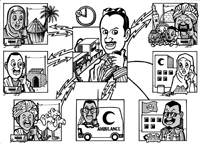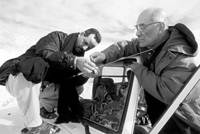Japan's Official Development Assistance White Paper 2007
Column 5 Linking the Sahara with Radio Net
— Veteran hams* passionately working to develop a radio network in Mauritania —
"Good morning! This is the Sahara-net station in Nouakchott. Any station has Medical or Emergency traffic, please check in."

Using a detailed illustration at a seminar to teach effective ways to use and maintain radio networks (Illustration: IARV)
People hear this radio call every morning at 10:00a.m., except for Fridays and holidays, in the area of 1,000 square kilometers covering Mauritania, a country located in the Sahara desert. The International Amateur Radio Volunteers (IARV) received the Grant Assistance for Japanese NGO Projects beginning in 2003, and currently operates fixed radio stations in about 80 different villages and 25 mobile stations in vehicles.
The IARV is a unique NGO which specializes in the construction of communication infrastructure. Yoshio Hayashi, President of IARV, had visited a Cambodian refugee camp by chance during a business trip to Thailand over 20 years ago. He had witnessed the tragic situation of refugees, and the dedication of volunteer doctors and nurses there. Hayashi, who aspired to participate in volunteer activities, conceived the idea to utilize his own hobby of amateur radio and organized the IARV with his friends. They acquired taxi transceivers that had been fully depreciated, fixed them, and recycled them for use in the ambulances of medical institutions in Cambodia, Laos, and the Palestinian Territory. These steady and unique efforts gained a reputation, and the international medical societies began introducing these efforts. Currently, IARV mainly conducts activities in various areas in the Sahara desert, a main stage of which is Mauritania.
Hayashi asserts the necessity of a radio network in the Sahara desert area, saying, "The use of mobile phones in African countries has spread in recent years; however, no company shows any sign of entering markets of the Sahara desert region considering profitability. Moreover, radio functions, which differ from one-on-one communication devices mobile phones, can transmit information to dozens of stations at once and break into lines when necessary, and are tremendously effective as an emergency communications network for people living in villages on wide-stretching desert areas." "A doctor in Nouakchott was contacted about a child in a village who was suffering from nausea and fever. He asked questions about the condition of the child using a radio and quickly diagnosed the child as suffering from malaria. Medicine was immediately delivered to the child for treatment, and saved his life. Without the radio, a great amount of time and money would have been spent on transferring the suffering child to a town."
In addition to medical consultation purposes, the benefits of radio networks extend to many areas, incorporating activities including searching for lost camels, assisting with disaster prevention by providing warnings about sandstorms and locust swarms, preventing the depopulation of villages, and promoting activity in local industries (it is possible to place product orders and exchange information without leaving the village).
Hayashi and his colleagues hold community seminars on the method for effective use of this type of radio communications network and proper maintenance technique as well. They utilize illustrations which are easily understandable for everyone considering the diversity of local languages in Africa. They no longer use secondhand taxi radios now that they are able to receive financial assistance. Nevertheless, they have not forgotten considerations for environmental preservation as 90% of the radio stations built in Mauritania have adopted the use of solar batteries.
The average age of the IARV members is 65. "'People who have drunk the water in Africa will come back to Africa.' Just as this proverb reads, I am delighted that there are many members who wish to conduct activities in Africa again," says Hayashi, with an embarrassed smile, who will turn 78 this year. The passion for international cooperation does not depend on age, and there are Japanese NGOs conducting activities in developing countries that utilize skills acquired from hobbies.

An IARV volunteer teaching a Mauritanian engineer on adjusting the antenna of a mobile radio station (Photo: IARV)


 Next Page
Next Page